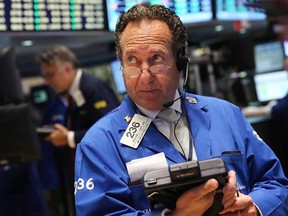What cyclical stocks to own as interest rates rise
"High dividend stocks are likely to benefit less — or be less sensitive to — rising rates in the current environment."

Article content
The decline in U.S. treasury yields since the beginning of 2014 has helped both defensive sectors and high-dividend stocks outperform the market. But investors are starting to question the sustainability of this leadership as the U.S. Federal Reserve moves closer to a rate hike.
The good news is that equities in low interest rate environments typically produce positive returns as rates rise. Jonathan Golub, chief U.S. market strategist at RBC Capital Markets, pointed out that the same holds true for high-dividend stocks, but to a lesser extent.
In other words, “high dividend stocks are likely to benefit less — or be less sensitive to — rising rates in the current environment,” he told clients.
To mitigate this underperformance, Mr. Golub recommends investors seek dividend yield in more cyclical sectors.
The strategist highlighted the top cyclical dividend-yielding stocks by sector. In energy, Transocean Ltd. topped the list with a 14.2% yield, followed by Diamond Offshore Drilling Inc. and Ensco PLC.
In the materials space, Freeport-McMoran Inc. leads the way with a 6.5% dividend yield, followed by Dow Chemical Co. and Lyondellbasell Industries.
General Electric Co. topped the list of industrials at 3.9%, followed closely by Eaton Corp. PLC and Pitney Bowes Inc.
In the consumer discretionary space, Mattel Inc. comes in with a 5.5% dividend yield, while Wynn Resorts Ltd. and Gamestop Corp. are at 4.1% and 4%, respectively.
In the financials sector (excluding REITs), Peoples United Financial Inc. leads the way with a 4.8% yield, followed by CME Group Inc. and Cincinnati Financial Corp.
In the technology sector, Seagate Technology PLC topped the list with a 3.4% yield, followed by Paychex Inc. and Microchip Technology Inc.
“While stock prices move in the same direction as bond yields, they are much less sensitive to changes in short rates,” Mr. Golub added. “This suggests that an increase in the fed funds rate matters far less if it results in a flattening yield curve.”






Postmedia is committed to maintaining a lively but civil forum for discussion. Please keep comments relevant and respectful. Comments may take up to an hour to appear on the site. You will receive an email if there is a reply to your comment, an update to a thread you follow or if a user you follow comments. Visit our Community Guidelines for more information.